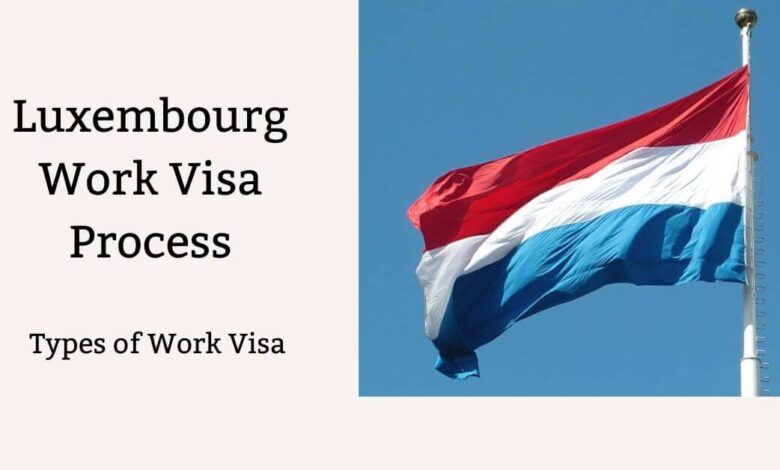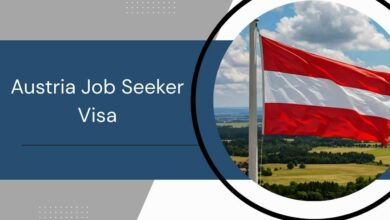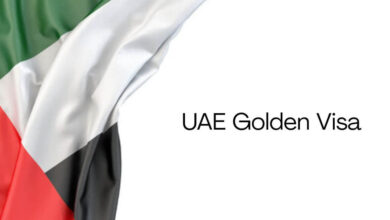Luxembourg Work Visa Process 2026 – Types of Work Visa

Thinking about working in Luxembourg? The work visa process is the first step to starting your career in this small yet powerful European country. Jobs available to foreign workers are usually full-time and on-site, especially in sectors like finance, healthcare, hospitality, and construction, though some companies now offer hybrid or remote roles in IT and business services.
Salaries in Luxembourg are among the highest in Europe, with most full-time positions ranging from €35,000 to €65,000 per year, depending on your skills, qualifications, and industry. Employers often prefer candidates with 2 to 5 years of experience, but entry-level opportunities are also available, especially in support roles.
The best part? Securing a Luxembourg work visa doesn’t just mean a stable job it’s also your gateway to living in a safe, multicultural country at the heart of Europe, where professional growth and quality of life go hand in hand.
Understanding Luxembourg’s Need for Workers:
Luxembourg faces a shortage of workers in various sectors, ranging from technology and finance to agriculture and construction. This has led to an influx of foreign workers, particularly from countries outside the EU, EEA, and Switzerland. Luxembourg offers not only a high standard of living but also a host of social benefits, including free healthcare, extensive workers’ rights, and low taxes, making it an attractive destination for job seekers.
Work Visa Requirements for Luxembourg Work Visa Process:
If you’re not from an EU, EEA, or Swiss country, you’ll need to obtain a long-stay work visa (also known as a national visa) to live and work in Luxembourg for more than 90 days. The visa allows you to stay for up to one year, with the option for renewal. The process can be broken down into the following steps:
1. Obtain a Job Offer from a Luxembourg Employer:
- Before applying for a work visa, you must have an official job offer from a company located in Luxembourg. The employer must demonstrate that they couldn’t find a suitable candidate within the EU or EEA. The company may also need to submit a Labor Market Test through Luxembourg’s National Employment Agency (ADEM).
- The job contract should clearly outline your salary, working hours, and job description.
2. Apply for Temporary Authorization:
- Once you have a job offer, the first step is to obtain temporary permission to stay (authorization de séjour temporaire) from the General Department of Immigration. This temporary permission allows you to proceed with the visa application and is typically handled by your employer.
3. Submit the Long-Term Visa (D Visa) Application:
- With your temporary authorization in hand, the next step is to apply for the D visa. This visa allows you to live and work in Luxembourg for more than 90 days. You can submit your application at the Luxembourg embassy or consulate in your home country or the country where you have legal residence.
- Required documents for this application include:
- A valid passport with at least 6 months of validity
- A signed job contract
- Proof of adequate health insurance
- Evidence of sufficient financial means (e.g., recent bank statements)
- A clean criminal record certificate
- Proof of accommodation in Luxembourg
4. Register with Local Authorities:
- Within three days of arriving in Luxembourg, you must register with the local government office. This is necessary for your residence card application and allows you to legally reside in the country.
5. Medical Examination:
- Depending on the nature of your visa, you may need to undergo a medical examination in Luxembourg. The examination typically includes a general health checkup to ensure that you are fit for work.
6. Apply for Residence Permit:
- After registering your residence, you must apply for a residence permit (“titre de séjour“) within three months of arrival. This permit allows you to live and work in Luxembourg for an extended period. After living in Luxembourg for five years, you may be eligible for a permanent residence permit.
Types of Luxembourg Work Visas:
There are two main types of work visas for Luxembourg:
1. Long-Term Visa (D Visa):
- This is the most common type of work visa and is for individuals who plan to stay in Luxembourg for over 90 days. It is suitable for salaried workers in various sectors, including finance, IT, education, and agriculture.
- Processing Time: Approximately 4-6 weeks after application submission.
2. EU Blue Card:
- The EU Blue Card is designed for highly qualified workers from non-EU/EEA/Swiss countries. This visa provides several benefits, including faster processing times and better family reunification opportunities.
- Requirements include a higher education degree and a job offer with a salary that is above average for Luxembourg.
- This visa makes it easier for employees to move between EU member states.
Luxembourg Work Visa Process: Step-by-Step Guide
Here’s a more detailed breakdown of the application process:
Step 1: Get Temporary Authorization:
- Where to apply: Ministry of Home Affairs in Luxembourg (via employer)
- How long it takes: Typically, 1-2 weeks to process, depending on the employer and documentation.
Step 2: Submit D Visa Application at Embassy:
- Where to apply: Luxembourg embassy or consulate in your home country
- Required documents: Job contract, passport, health insurance, and other supporting documents.
- Visa fee: Varies by embassy, typically around €50 to €100.
Step 3: Register in Luxembourg:
- Where to register: Local municipal office (commune)
- Time frame: Must register within three days of arrival.
Step 4: Complete Medical Examination:
- Where to do it: Designated health centers in Luxembourg
- Cost: Typically covered by the applicant or employer.
- Required: A general health check to ensure fitness for work and no contagious diseases.
Step 5: Apply for a Residence Card:
- Where to apply: Ministry of Home Affairs (Immigration Directorate)
- Required documents: Temporary authorization, passport, job contract, and medical exam results.
Step 6: Permanent Residence
- After five years of continuous legal residence, you may be eligible to apply for permanent residency in Luxembourg.
Read Also: Luxembourg Work Visa for Indians
Visa Costs and Processing Time:
- Temporary Authorization: No fee (typically handled by the employer)
- Long-Stay Visa (D Visa): Typically €50-€100
- Residence Permit: Around €50
- EU Blue Card: Similar cost to D Visa, but fast-tracked processing is available for highly qualified workers.
Benefits of Jobs:
Access to the EU Job Market:
- With a Luxembourg work visa, you can travel throughout the Schengen Zone and work and reside in one of the richest EU nations.
High Standard of Living:
- Luxembourg provides top-notch healthcare, bilingual education, first-rate public services, and a high degree of personal safety.
Attractive Salaries & Tax Benefits:
- The minimum salary in Luxembourg is among the highest in Europe, and income is frequently supplemented by tax breaks and social security benefits.
Pathway to Permanent Residency & Citizenship:
- You can seek permanent residency after living there continuously for five years. Citizenship might be available after five more years (with integration and language requirements).
Family Reunification:
- Family reunification is made possible via the visa application process, which permits dependent visas for your spouse and kids.
Diverse Multicultural Environment:
- With a large expat population and a trilingual population (French, German, and Luxembourgish), Luxembourg is renowned for its welcoming and global workplace culture.
Job Opportunities and Popular Industries in Luxembourg:
Luxembourg’s labor market is diverse, with key industries driving the demand for foreign workers. These include:
- Finance and Banking: Luxembourg is one of the world’s most important financial hubs, with many opportunities for finance professionals, particularly in investment banking, asset management, and insurance.
- Technology and IT: As a rapidly growing tech hub, Luxembourg offers roles for software engineers, data scientists, IT consultants, and cybersecurity experts.
- Engineering and Manufacturing: There is a steady demand for skilled labor in construction, civil engineering, and specialized manufacturing sectors.
- Agriculture: With its growing demand for workers, Luxembourg also seeks agricultural laborers, especially in strawberry farming and other seasonal work.
- Health and Social Care: The healthcare sector is also expanding, with demand for doctors, nurses, and health technicians.
Conclusion:
Luxembourg presents a wealth of opportunities for workers from around the world. Whether you’re seeking a high-paying job in the financial sector or a position in construction or agriculture, the country offers competitive salaries, a high quality of life, and a range of benefits.
The process of obtaining a work visa is straightforward but requires careful attention to documentation and deadlines. By following the steps outlined in this guide, you can ensure that your application for a Luxembourg work visa is as smooth and efficient as possible.
Frequently Asked Questions:
Who needs a work visa to work in Luxembourg?
People from outside the EU, EEA, or Switzerland who want to work in Luxembourg for more than 90 days need a long-stay visa, which is also called a national visa. People with this visa can work, study, or live in Luxembourg forever.
What are the requirements for obtaining a Luxembourg work visa?
To get into Luxembourg, you need a job offer from a company there, permission from the National Employment Agency (ADEM), a clean criminal record, a current passport, health insurance, a bank statement, and copies of your school records.




